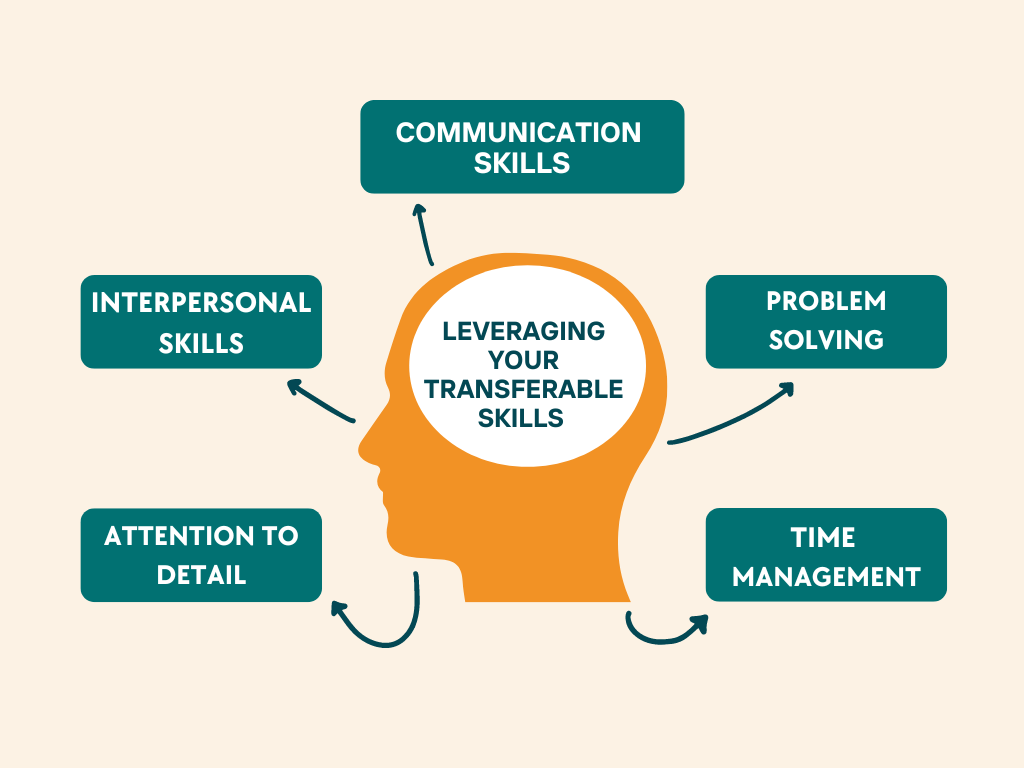In today’s competitive job market, successfully landing a job without direct experience in a particular field can seem daunting. However, many successful professionals navigate this challenge by leveraging their transferable skills.
What are transferable skills?
Transferable skills are core competencies that are not confined to a specific job or industry. They include both hard and soft skills, such as communication, problem-solving, project management, and technical abilities, and can help you break into a new industry or role even when your resume might not align perfectly with the job description.
Identifying Your Transferable Skills
To start with, identify your transferable skills by reflecting on your previous roles, volunteer work, education, and even hobbies. Ask yourself:
- What tasks did I excel at?
- What challenges did I overcome, and how?
- Which skills did I use to achieve success in my previous roles?
Once you’ve pinpointed your transferable skills, consider how they align with the job requirements.
Transferable skills in the regulatory sector
In the regulatory sector, transferable skills are particularly valuable.
Regulatory roles often require analytical thinking, attention to detail, communication, and problem-solving skills that can be applicable in various professional environments. If you’ve worked in quality assurance or compliance in another industry, you likely possess a keen eye for detail and a solid understanding of regulatory frameworks, even if they’re not specific to the sector you’re targeting.
Are you new to the sector? These articles will help guide you with tips to land your first job at a regulatory body in Canada. Tips to Land Your First Job at a Regulatory Body in Canada: Part One and
Tips to Land Your First Job at a Regulatory Body in Canada: Part Two
Here are 10 examples of transferable skills that may be applicable in your next job role:
Communication Skills
- Examples: Writing emails, creating reports, giving presentations, active listening.
- Applications:
- Customer Service: Communicating clearly with customers.
- Regulatory Affairs: Explaining regulations to ensure compliance.
Problem-Solving
- Examples: Identifying issues, analyzing options, implementing solutions.
- Applications:
- Operations Management: Streamlining processes.
- Quality Assurance: Resolving compliance issues.
Project Management
- Examples: Planning tasks, setting deadlines, managing resources.
- Applications:
- Event Planning: Organizing events.
- Marketing Campaigns: Managing timelines and budgets.
Leadership
- Examples: Mentoring team members, setting goals, motivating others.
- Applications:
- Retail Management: Leading a team to meet sales targets.
- Healthcare: Guiding a team of nurses.
Analytical Skills
- Examples: Data analysis, trend spotting, critical thinking.
- Applications:
- Market Research: Analyzing consumer data.
- Finance: Evaluating financial reports.
Time Management
- Examples: Prioritizing tasks, meeting deadlines, balancing projects.
- Applications:
- Administrative Support: Managing schedules.
- Consulting: Balancing client projects.
Adaptability
- Examples: Learning new systems quickly, handling unexpected challenges.
- Applications:
- Technology: Adapting to new software.
- Education: Adjusting teaching methods.
Interpersonal Skills
- Examples: Building relationships, teamwork, conflict resolution.
- Applications:
- Sales: Building relationships with clients.
- Human Resources: Mediating conflicts.
Technical Skills
- Examples: Proficiency with software, data analysis tools, equipment operation.
- Applications:
- Graphic Design: Using design software.
- Data Analysis: Using tools like Excel or Python.
Attention to Detail
- Examples: Spotting errors, following procedures precisely.
- Applications:
- Editing and Proofreading: Ensuring accuracy in written materials.
- Inventory Management: Tracking stock levels accurately.
Showcase Your Skills in Your Resume and Cover Letter
Your resume and cover letter are your first opportunity to showcase your transferable skills. Instead of listing job titles and duties, focus on the skills you used and the results you achieved. Use bullet points to detail specific instances where your skills made a positive impact.
In your cover letter, directly address the skills that are most relevant to the job you’re applying for. Explain how these skills make you a strong candidate, despite your lack of direct experience in the field. This proactive approach can help you stand out to potential employers.
If you’re still looking to perfect your resume and cover letter for regulatory roles, check out our article on Crafting A Standout Resume for Regulatory Roles.
Preparing for Interviews
When you secure an interview, be ready to discuss how your transferable skills align with the job requirements. Prepare specific examples that illustrate your ability to apply these skills in various contexts. Employers are often more interested in your potential to contribute to their organization than in your past job titles. Show them how your skills can solve their problems, and you’ll be more likely to win them over.
Sign Up for RegulatoryJobs.org
Looking to excel in your next interview? Then keep an eye out for more tips to advance your career in regulation and consumer protection!
Need to find a regulatory body or a regulated professional? Discover more at Regulatory Guide.Ca today
Are you registered on RegulatoryJobs.org? Creating a free job seeker account is an easy way to connect with global opportunities in regulation and consumer protection. Don’t miss out—sign up today!
